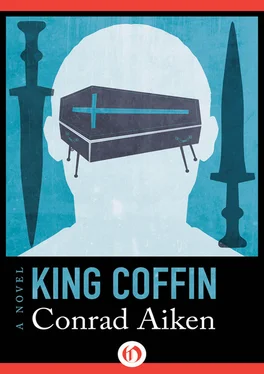To kill them, yes: what was necessary was a machine gun.
The beautiful terribleness of the deed!
He stood still in the dark canyon of Beacon Street, between the somber stone walls of his own canyon, at the bottom of his own sky, at the center of his own world, and aimed his pipe stem like a gun across the paving stones toward a small crowd which stood before one of Houghton and Dutton’s windows. The fascinating impulse was already quivering in his index finger. The stupid backs were cut in two by death’s mechanical rattlesnake chatter, the plate glass window was drilled shrilly from side to side, the falling glass made an irregular tinkling and chiming, and then everything was again silent. It was toward a group of dead men that he crossed the street, it was a group of corpses that he joined before the window, and looking over the heads he saw that the window had been turned into a little zoo, it was a cage of monkeys. A dozen little gray monkeys, with long ratlike tails, skipped, sat, or swung, stared sadly, peered out of kennels, or made rapid circuits of the interior, scarcely seeming to touch floor, wall, trapeze or platform in their soundless flight. Close to the window, in the foreground, oblivious of the onlookers, one of them picked with fastidious little black fingers at the posterior of another, and tasted what he found: the crowd laughed obscenely, face turned grinning toward grinning face, their animal blood thickened and darkened. It was Sandbach observing the obscenity of Sandbach, the foulness was irremediable.
Sandbach, speaking of treachery!
He turned away, up the hill, in the deepened evening, the darkened world, felt in every direction and dimension the swift growing and extension of new structure, new thrusts and explorations into the infinite, but all of it a little crazy, perhaps, a little headlong and awry. Why was this? The affair of the meeting had been, certainly, only a partial success, it was in some measure because he had gone there with his plans unformulated, with nothing but his anger and contempt, and therefore it had got beyond his control: or at any rate, his control had not been quite perfect. This remained tethered to him, as by threads or eyebeams, as if himself, the puppetteer, had become subtly and dangerously entangled in the threads of his own puppets, could not quite escape from them, found their voices still at his ears, like gnats. The meeting was still there, in Tremont Temple, Sandbach was still breathing thickly down his nose at Breault, Mrs. Taber cooed her professional old-lady’s sweetness, they stood in a group round the varnished platform and chattered about manifestos and propaganda and the founding of a paper or the revival of The Voice of the People , in Saint Louis, or The Anarchist , in Boston, or whether the No Hat Club might be re-established, or they should join the Socialists, secretly, and operate “from within.” Now perhaps they were rustling down the stairs, they were saying his name, Ammen, and again Ammen, laughing angrily, they walked in twos and threes into Pemberton Square and past the dark courthouse, under the dark windows made foul with the piled nests of pigeons. They must be dismissed, they had been dismissed, their path lay now at right angles with his. They had gone to Sandbach’s bleak room in Allston Street, to look adoringly at the portrait of Bakunin which hung above the fireplace of smooth-carven white marble, relic of a capitalist past.
Dismissed. His fumbling amateurish past dismissed, his slave-self strangled and cast out. He would be an infusible one. He said aloud — egoism is the essence of the noble soul, every star is a similar egoist, I revolve like Nietzsche proudly amongst my proud equals. But then from the street and the houses, the hill of houses around him, came the ugly shapes of his amateurish past, the sordid ill-directed history of two years, the voices and faces of Sandbach, Gottlieb, Toppan, Mrs. Taber, Gerta (but with exceptions), the frequenters of the esthetic little candlelit restaurants on the hill, the shadowy denizens of the radical “parties,” smelly young women and unwashed young men. It had been a mistake, a miscalculation, but need one be too concerned about it? It was all there, no doubt, it was a part of him, this alien city was a part of him, was in a sense himself, it could be accepted and dismissed. It had now become simply a background, it had receded from him, like the evening itself with its pale stars, it would henceforth serve merely as the rich backdrop for the action to come. And for this purpose all that scene of the past would be useful: the meetings at Tremont Temple, at the printing press in Hanover Street, in Gerta’s room or Sandbach’s, the midnight conclaves at the C Bookshop: Gottlieb’s drinking parties, the literary young men and women, the lesbians and pansies, the endless pseudo-intellectual talk, the indiscriminate alcoholic amorousness: it now died away drowsily like the chorus fading off stage at the opera, fading and dying before the coming of that profound and meaningful silence in which the action will suddenly deepen to tragedy.
The action to come.
He quickened his step at the thought of it, the shape of it urged him forward, but at the same time he wanted to delay the meeting with Gerta, and crossed Beacon Street into the Common. Had Gerta, in fact, also become unimportant, dropped into that background? The idea was just faintly disagreeable. To cut oneself off, yes — but might Gerta still be useful? actively, or receptively, useful? Some one to talk to, but of course only partially , not with complete confidence. One must be aware of her duplicity henceforth, the doubleness supplied by Sandbach: Sandbach’s shadow would be always just over her shoulder. What one said to her must be calculated therefore for a double purpose, the echo must be taken into account, and this in itself would actually be amusing …
He sat down on the bench under the light below Walnut Street. Two men came down the stone steps, talking, one of them paused to strike a match.
— Well, I’m a great soup-eater. I’m very fond of soup. Now I’ll eat meat only once a day as a rule, but I’m very fond of soup …
They went down the curved brick path toward the pond, talking about soup. This too to know! But Gerta was waiting there, leaning out of her window with a bitten apple, Gerta was the question, and perhaps the answer was in the affirmative. And perhaps especially, perhaps all the more so, because now, with the intervention of Sandbach, something of the purely personal pressure between them would have ceased: the relation could be calm, sexless, cerebral: the other aspect or possibility would be once and for all removed. He could make her listen, make her the receptacle of his hate, compel her to be, as it were, the praegustor of his new poisons, observe her horror. She could be forced into a half unwilling alliance, and one of which she would of course intensely disapprove. And she wouldn’t dare to interfere, she wouldn’t dare to discuss it with Sandbach. Or would she? And if she did, would it so much matter? But how much should he tell her? She posed as a liberal, a radical, as emancipated — but how much would she dare ? To test and press her, in this direction, would be delicious, would be an important part of the venture, the experiment — yes, she would be indispensable—
He ran up the steps, remembered how once he had found there, on just such an evening, a woman’s handkerchief and ten dollars in neatly folded bills, touched the iron railing with his hand, and in another moment, admitted by the old Negress, Sally, was on his way up the carpeted stairs. Apollo stood listening in his plaster niche in the curved wall, as well he might: from the front room, that of the two gay girls from Haverhill, came the sound of the eternal radio, did you ever see a dream walking, well I did, did you ever hear a dream talking, well I did, he heard them laughing, and through the partly open door saw one of them, the younger one, in her knickers, her back turned, one foot on a stool to pull up a stocking.
Читать дальше












